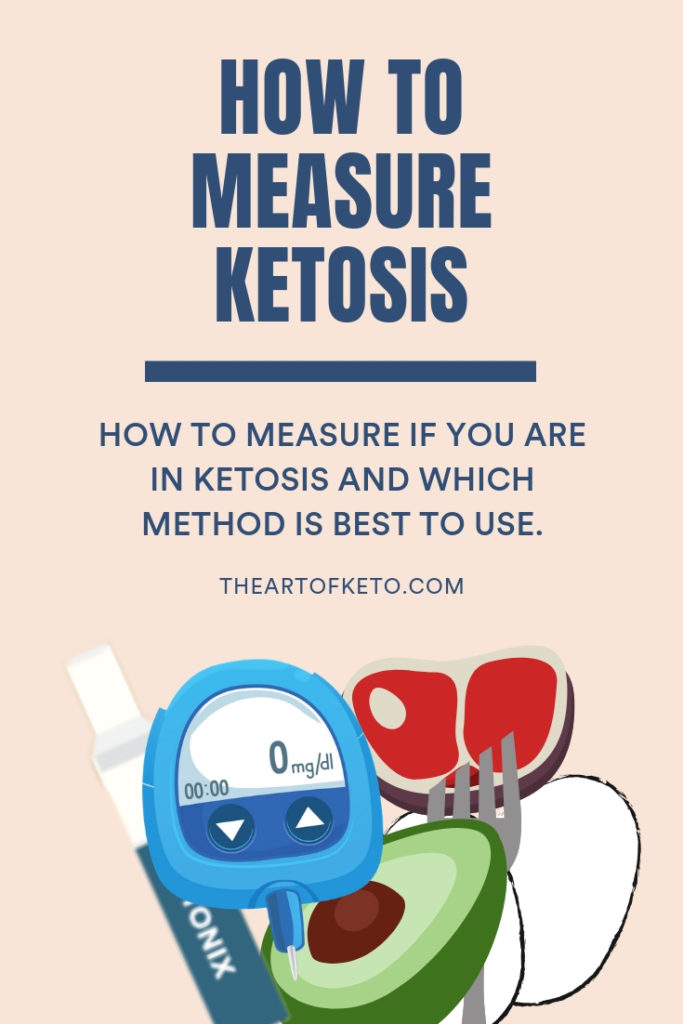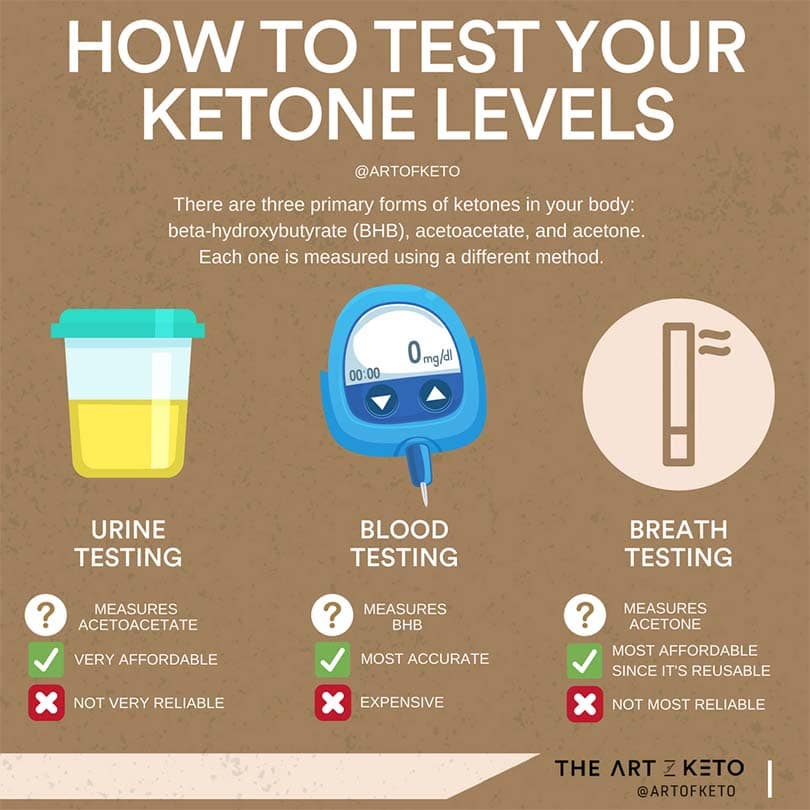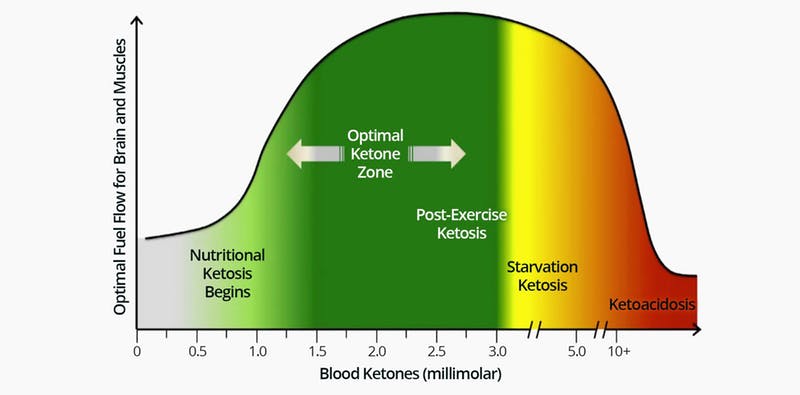Have you been on a ketogenic diet for some time and are wondering how to tell if you are in ketosis?
Or maybe you're like us and want to have something tangible or measurable.
One of the most commonly asked questions we get is, “How do I check my ketone levels?”
In this post, we're going to go over the what and how of measuring your level of ketosis.
How to measure ketosis?
The three primary methods of measuring ketones in your body, all of which have their advantages and disadvantages are:
- Blood Ketone Meter
- Breath Ketone Meter
- Ketone Urine Strips

First, we'd like to lay out the foundation, this way you understand exactly WHAT you are measuring.
There are three primary forms of ketones in your body, beta-hydroxybutyrate, acetoacetate, and acetone. Hence, the three primary methods of measuring your level of ketosis.Each of the three ketone bodies is measurable because they spill over into different areas of your body: your urine, breath, and blood.
No one measurement or form is greater or worse than the other, but when it comes to a “gold standard,” or what is commonly referenced in medical literature, levels of beta-hydroxybutyrate (BHB) is most typical.
Furthermore, the three different ketone bodies are easily measurable within the comfort of your home. Thus, there is no need for you to pay for any fancy lab tests or buy super high-end equipment.
So, let's dive in with a closer look at each method along with their advantages, disadvantages, best practices, and our recommendations.

Measuring Ketones in Urine via urine test strips. (acetoacetate)
Urine test strips are the most common AND most cost effective (cheapest) way to measure whether you are in ketosis. Ketosis urine strips accomplish this by measuring any unused acetoacetate excreted in your urine.
Often, we recommend keto test trips for beginners wanting an easy way to measure ketosis or those just getting into some form of tracking.
How to use urine test strips
You use the ketosis strips by holding it in your urine stream for a couple of seconds, and within about 30 seconds the color will change indicating acetoacetate concentration in your urine.
Most urine strips colors typically range from a beige or pink (low concentration) up to a dark purple (higher concentration).
Most, if not all, urine strip packages come with a reference color chart letting you know the concentration of ketone bodies (acetoacetate) in your urine.
The one warning is, once your body is “keto-adapted,” people have reported lower readings, and some even report no reading at all.
The theory being that the body becomes more efficient at using acetoacetate or converting it over to beta-hydroxybutyrate (BHB) from your fat, thus resulting in a lower level or absence of acetoacetate that is reading on the strip.
Another factor that can affect your urine test strip reading is your present electrolyte balance and hydration levels. The more concentrated (dehydrated) or diluted (hydrated) your urine, the more it will affect your readings.
Urine strips can be an excellent method to test if you are in ketosis when just starting or transitioning to a ketogenic lifestyle, but once you've been on a ketogenic diet and wish to continue testing, we'd recommend one of the next two forms of measuring ketones we will go over.
Are urine ketone strips accurate?
Not necessarily the most accurate method, but the easiest and the cheapest.
PROS:
- Cheap
- Easy to find
CONS:
- Not the most accurate
- May be messy
- May show a false reading depending on your electrolyte balance, hydration level, or how long you've been on a ketogenic diet.
With that said, you can usually find ketosis urine strips at your local Walmart, Walgreens, CVS, and even Amazon
Recommended: Perfect Keto Urine Test Strips
Measuring ketones in your breath. (acetone)
Measuring your level of ketosis using your breath does not use ketosis strips like the other two methods. Instead, measuring ketones in your breath is accomplished via a breath meter aka Ketonix meter.
Breath ketone meters are increasing in popularity among the ketogenic crowd but may come with a hefty upfront investment of around $200.
The advantage that breath meters have is the reusability factor; this means you can test as many times as your heart desires without the need to purchase additional ketosis sticks of any kind.
Additionally, research tends to show that there may be a direct correlation between the acetate found in the breath and levels of BHB in the blood.
How to use a ketonix breath meter
To use a ketonix breath meter, you would take the meter and plug it into the USB port on your computer. Once the unit has warmed up properly, blow into the meter until the light indicates that your breath acetone levels are being registered.
Software is included with the breath meter for easy measurement and tracking. Typically, the meter will range in colors much like the urine test strips with green indicating the least amount of acetone and red indicating the most acetone.
While a breath meter is much more accurate than the urine test strips, they may vary widely compared to that of a blood ketone meter. This places the ketonix meter as a middle ground between the urine ketosis strips and blood meter in our recommendation.
PROS:
- Reusable
- Doesn’t require bodily fluids
CONS:
- Larger upfront investment
- More time consuming
- Possible innacuracies
If you are on a budget but want something a bit more accurate than urine strips, we would recommend a Breath Meter.
However, if you want something a bit more accurate, don't mind pricking your finger, and it’s ok to buy blood ketone strips. Go with a blood meter.
Recommended: Ketonix Breath Meter
Measuring ketones in your blood. (beta-hydroxybutyrate)
Blood ketone meters are highly considered the “gold standard” when it comes to measuring your level of ketosis. Blood ketone meters work by measuring real-time levels of BHB in your blood, the primary ketone body you produce once in ketosis.
There's a reason supplement companies are now coming out with exogenous BHB supplements, but that is a whole other story.
Testing levels of ketones via the blood is the same way a diabetic would check their blood sugar; prick your finger, squeeze out some blood, and place it on a blood ketone strip.
Furthermore, since your blood is a very tightly regulated system, blood meters tend to be the most consistent and accurate since factors like hydration won't skew the results.
How to use a ketone blood meter
As said, using a blood meter to test for ketones is the same way someone with diabetes would check their blood sugar.
First, alcohol swab the area you are testing, pull back on the included lancet and press it gently against your skin (generally your fingertip), press the button to release the lancet (needle) and a walaa.
You'll either have a drop of blood already exposed because of the prick or you may have to squeeze your finger to produce a drop of blood.
You may have to prick your finger again.
Afterward, place the blood onto the blood ketone strip and insert the strip into the meter. Results take about 3-5 seconds to pop up on the screen.
Again, blood ketone meters are the most accurate, but they do come at the cost of having to purchase strips that range anywhere from $1-$2 per strip.
And if you tend to be a little squeamish or the site of blood, this may not be the best option for you.
It's not that bad once you get used to it or have someone else do it for you.
PROS:
- Most accurate
- Most reliable
CONS:
- Buying strips over time can add up $$$
- If you hate the site of blood, this may deter you altogether.
If you were to go with any of the three above methods, we would recommend a blood ketone meter hands down.
Recommended: Keto Mojo Blood Ketone Meter
Checking ketosis without the use of equipment.
Perhaps you don't care to track using the above methods or want a general idea of whether or not you are in ketosis.
Which begs the question, can you feel when you are in ketosis?
While not the most accurate, or even 100% indicative of being in ketosis, you can kind of tell if you are in ketosis if experiencing one, many, or all of the symptoms below.
Metallic or fruity smell to your breath
That's right, what's also commonly referred to as “keto breath,” is a fruity almost nail polish type of scent to your breath. As described above, the breath ketone meter measures acetone that you expel while breathing.
It would only make sense that there would be a nail polish smell (acetone) to your breath which is commonly used as nail polish remover.
Mental clarity
The brain uses up a significant amount of energy and prefers ketones over glucose to fuel that requirement. Without having to rely on carbohydrates/sugar for energy the brain has a more stable and constant supply of fuel from either dietary fat or your body fat.
Many people report feelings of not only mental clarity but a euphoric feeling.
More stable and increased energy
Aside from the initial adaptation period, in which you may feel sluggish or experience symptoms of the dreaded “keto flu,” your body will have a constant supply of energy
Much like your brain, your body will derive its energy primarily from fat from your diet or tap into that pesky body fat.
Decreased hunger
One of the most significant benefits that make a ketogenic diet so great is its ability not only to decrease sugar cravings but hunger in general
Because your body has a constant supply of energy even without food, it won't have the same cravings as it would have on a carbohydrate-based diet.
Increased thirst and urination
As the body burns through stored glycogen (glucose) you'll be excreting tons of excess fluid from your body.
Since insulin is lower on a ketogenic diet, the kidneys excrete sodium at an increased rate. It is essential that you raise sodium on a ketogenic diet.
Optimal ketosis and ketone readings
There is a constant debate on what the “optimal” ketone range should be. Some would even have you believe that higher levels of ketones equate to higher levels of weight loss.
As far as we can tell and from personal experience, this is false. There is no “optimal ketone reading for fat loss.”
… but don't let that stop you from testing and coming to your own conclusion.
As explained earlier, many see a decrease in ketone readings the longer they are in ketosis. What's happening exactly may be debatable, but the consensus is the body becomes more efficient at using ketones leaving few if any to be spilled over and measured
With that said, since the most accurate form of measuring ketones is via a blood meter, we'll use that as our primary reference.
What is a healthy ketone level?
In general, according to Phinny and Volek's publication of Art and Science of Low Carb Living, nutritional ketosis begins at a reading of .5 mmol/L and anything below you are not considered to be in ketosis.
Below is a visual ketone chart as laid out by Phinney and Volek.

As you can see, nutritional ketosis begins at a reading of .5 mmol/L with the optimal zone between about 1.0 mmol/L and 3.0 mmol/L
Being above or below .5 mmol/L and 3.0 mmol/L respectively doesn't necessarily mean you're doing anything wrong or won't see results. Instead, think of it as a nutritional ketosis sweet spot where the benefits of ketosis seem to be experienced.
In general:
- Light ketosis: ~ < 1.0 mmol/L
- Optimal Ketone Zone – 1.0 mmol/L – 3.0 mmol/L
Some things I've personally observed is that the bigger my caloric deficit, the higher my ketone readings in general.
Also, your readings can vary depending on a myriad of factors such as:
- If you just worked out
- If you just ate
- Ingesting something like an MCT oil or ketone supplement.
This is why we recommend either taking a reading first thing in the morning or at the end of the day waiting at least an hour after your last meal. Whichever time you pick, just make sure you're consistent.
We're after results. Whether you're using a ketogenic diet to lose fat or gain muscle, it won't matter what your ketone readings are if you're not achieving your desired goals.
As the saying goes, chase results, not ketones. Unless you're using a ketogenic diet to manage, prevent, or treat specific diseases and ailments, there is no need to register the amount of ketones in your blood.
